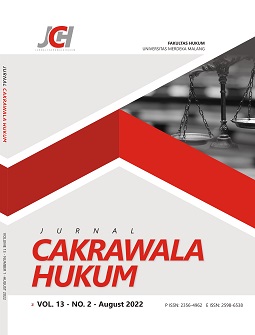The potential of money laundering in the regent election in Indonesia
DOI:
https://doi.org/10.26905/idjch.v13i3.8856Keywords:
Money Laundering, Local Government, Election.Abstract
Advances in information technology and globalization processes make it easier for transnational criminal groups to use the legitimate economy to disguise their operations and facilitate the rapid transfer of proceeds of crime to avoid investigation by law enforcement authorities. One of the prominent activities of organized crime is profiting from the illicit drug trade, corruption, or other results obtained or obtained, either directly or indirectly, through the execution of crimes that occur in the global financial system. This methodology makes the transaction appear as a legal business. Therefore, efforts to eradicate money laundering are a dynamic process, moreover, organized crime perpetrators are constantly looking for new ways to carry out their illegal goals. Money launderers also have the opportunity to submit their financial contributions for local elections (Pilkada). The practice of money laundering in elections is very likely to occur due to conditions that trigger opportunities for organized crime groups to launder money.
How to cite item:Â
Amrullah, M. (2022). The potential of money laundering in the regent election in Indonesia. Jurnal Cakrawala Hukum, 13(3), 231-241. DOI:https://doi.org/10.26905/idjch.v13i3.8856.
Downloads
References
Arief, M. (2003). Money Laundering, tindak pidana pencucian uang, Malang: Bayumedia Publishing.
Arief, B., N. (2022). The Use of Criminal Sanctions in Administrative Law, a paper presented at the National Conference on Criminal Law and Criminology, organized by ASPEHUPIKI with the Faculty of Law University of Surabaya. Prigen: Universitas Surabaya.
Ball, H., V. & Friedman, L.M. (1977). The Use of Criminal Sanctions in the Enforcement of Economic Legislation: A Sociological View, Dalam Gilbert Geis and Robert F. Meier, (ED), White-collar Crime: Offenses in Business, Politics, and the Professions. New York: The Free Press, A Division of Macmillan Publishing Co., Inc.
Esther, J. (2022). Conflict of Law Culture Consequence Law Transplantation in Indonesia Money Laundry Regulation. LEGAL BRIEF, 11(5), 2844–2852. Retrieved from http://legal.isha.or.id/index.php/legal/article/view/591.
Fauzi, A., Madjid, A., Aprilianda, N., & Djatmika, P. (2021). Rasio legis eksistensi pengadilan tindak pidana korupsi dalam sistem peradilan pidana Indonesia. Jurnal Cakrawala Hukum, 12(1), 11-20. DOI: https://doi.org/10.26905/idjch.v12i1.5779.
Hamsir, H. (2020). FENOMENA PEMAHAMAN DAN PENERAPAN HAKIKAT MAKNA KATA KEJAHATAN DAN PELANGGARAN DALAM PERKEMBANGAN HUKUM. Al-Risalah Jurnal Ilmu Syariah Dan Hukum, 19(2), 167-178. DOI: https://doi.org/10.24252/al-risalah.v19i2.12707.
Hamzah. A. (1998). Material of Nasional Upgrading: Criminal Law and Criminology. Semarang: Buana.
Kadish, S., H. (1977). Some Observations on the Use of Criminal Sacntions in Enforcing Economic Regulations, Dalam Gilbert Geis and Robert F. Meier, (ED), White-collar Crime: Offenses in Business, Politics, and the Professions. New York: The Free Press.
Lawrencya, L. & Dewi, M., D., P. (2021). KEJAHATAN SIBER SEBAGAI PENGHAMBAT E-COMMERCE DALAM PERKEMBANGAN INDUSTRI 4.0 BERDASARKAN NILAI BUDAYA INDONESIA. Prosiding Serina, 1(1), 276-286. DOI: https://doi.org/10.24912/pserina.v1i1.16377.
Mafazi, A., & Bahroni, A. (2021). Pencegahan tindak pidana terorisme di Indonesia. Jurnal Cakrawala Hukum, 12(2), 121-128. DOI: https://doi.org/10.26905/idjch.v12i2.4936.
Moens, G., A. (1994). Bank Confidentiality and Governmental Control of Exchange Operations and of Their Unlawful Effects – Australia, Dalam Paolo Bernasconi (ED), Money Laundering and Banking Secrecy, General Report of XIVth International Congress of Comparative Law. London: Kluwer Law International.
Nilsson, H., G. (1994). Preface, Dalam Paolo Bernasconi (ED), Money Laundering and Banking Secrecy, General Report of XIVth International Congress of Comparative Law, Athens. London: Kluwer Law International.
Pakpahan, K., Maggie, M., Prawito, C. A., & Pratama, W. D. (2020). Prinsip Notaris Dalam Pengenalan Pelaku Tindak Pidana Pencucian Uang. Ilmu Hukum Prima (IHP), 3(1). DOI: https://doi.org/10.34012/jihap.v3i1.929.
PBB document No. E/CONF.88/2 on 18 August 1994.
Reksodiputro, M., (1994). Sistem Peradilan Pidana Indonesia (Peran Penegak Hukum Melawan Kejahatan). Jakarta: Pusat Pelayanan Keadilan dan Pengabdian Hukum (d/h Lembaga Kriminologi) Universitas Indonesia.
Reksodiputro, M., (1994). Sistem Peradilan Pidana Indonesia (Peran Penegak Hukum Melawan Kejahatan), Dalam Mardjono Reksodiputro, Hak Asasi Manusia dalam Sistem Peradilan Pidana. Jakarta: Pusat Pelayanan Keadilan dan Pengabdian Hukum (d/h Lembaga Kriminologi) Universitas Indonesia.
Reksodiputro, M., (1997). Advancement of Economic Development and Crime, First Edition, Center for Justice Service and Legal Services (d/h Institute for Criminology). Jakarta: University of Indonesia.
Tambir, I. (2019). Pendekatan Restorative Justice dalam Penyelesaian Tindak Pidana di Tingkat Penyidikan. Jurnal Magister Hukum Udayana (Udayana Master Law Journal), 8(4), 549-574. DOI: https://doi.org/10.24843/JMHU.2019.v08.i04.p09.
Wagiman, w., & Susilo, M. (2021). RAHASIA BANK BAGIAN DARI PROSES MONEY LAUNDRY. Legal Standing: Jurnal Ilmu Hukum, 5(2), 38-46. DOI: https://doi.org/10.24269/ls.v5i2.3756.
Additional Files
Published
How to Cite
Issue
Section
License
Copyright (c) 2022 Jurnal Cakrawala Hukum

This work is licensed under a Creative Commons Attribution-ShareAlike 4.0 International License.
Authors who publish in this journal agree to the following terms:
The copyright of the received article shall be assigned to the journal as the publisher of the journal. The intended copyright includes the right to publish the article in various forms (including reprints). The journal maintains the publishing rights to the published articles. Authors must agree to the copyright transfer agreement by checking the Copyright Notice column at the initial stage when submitting the article.









